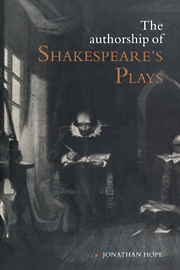5 - Shakespeare as collaborator
Published online by Cambridge University Press: 17 August 2009
Summary
The Shakespeare–Fletcher collaborations
In this section I consider three plays which have been linked to the names of Shakespeare and Fletcher: Henry VIII, The Two Noble Kinsmen, and The Double Falshood (‘Cardenio’). I begin each study with a consideration of the auxiliary ‘do’ evidence, because this is generally the most reliable indicator of likely authorship, especially between Shakespeare and Fletcher. The implications of this are then reviewed in the light of evidence from relative marker choice, and, in the case of Henry VIII, T/V choice. Because T/V choice has such serious limitations as socio-historical linguistic evidence, I have not used it in subsequent studies.
Henry VIII
The authorship of Henry VIII was not called into question until the mid-nineteenth century, when two critics working independently (Hickson 1850, Spedding 1850) published articles which suggested that the play was in fact a collaboration between Shakespeare and John Fletcher, a younger playwright who eventually succeeded Shakespeare as contracted dramatist to the King's Men theatre company. A series of articles since then, culminating in the work of Cyrus Hoy (1962), has confirmed the presence of two hands in the play (see Farnham 1916, Partridge 1949, Oras 1953, Law 1959, Horton 1987). The major divisions of the play are summarised in table 5.1.
Doubts remain, however, about the precise shares of Shakespeare and Fletcher in the play: before Hoy, a consensus had developed, but his work reassigned to Shakespeare several scenes traditionally given to Fletcher.
- Type
- Chapter
- Information
- The Authorship of Shakespeare's PlaysA Socio-linguistic Study, pp. 67 - 105Publisher: Cambridge University PressPrint publication year: 1994



